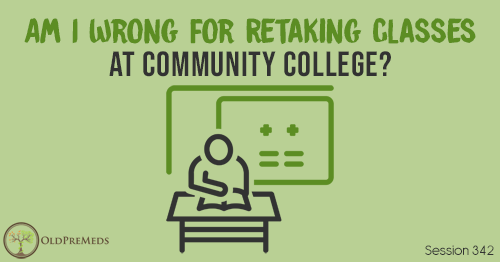Apple Podcasts | Google Podcasts
Session 334
This premed isn’t sure if their timeline is going to line up well when they have so much on their plate already.
Questions answered here on the podcast are taken directly from premedhangout.com. Go ask your questions there and use #OPMquestion.
Also, please be sure to check out all our other podcasts on Meded Media as we try to bring you as many resources as you need on this journey.
Listen to this podcast episode with the player above, or keep reading for the highlights and takeaway points.
The MCAT Minute
The MCAT Minute is brought to you by Blueprint MCAT.
As a non-traditional student, you might find your time to be even more precious than that of traditional students. After all, everyone only has 24 hours in a day. Traditional students often don’t have the same responsibilities, such as supporting a family or working full-time jobs to make ends meet.
Of course, there are exceptions, with some managing these tasks amazingly well. However, as a non-traditional student, you typically have more obligations, leaving less time for other activities. That’s where Blueprint MCAT comes in – it’s a free online scheduling tool available at blueprintmcat.com that can be an invaluable resource for effectively planning your time.
OldPreMeds Question of the Week
“As a non-traditional student and active duty military member with two young children, I’m contemplating the timeline for applying to medical school.
My current plan is to apply in six to seven years after my contract ends, although this may change. I’m currently pursuing a DIY postbac, taking one to two prerequisite courses at a time. If all goes well, my children will be around nine and seven when I apply. I’m concerned about the challenges of balancing medical school with parenting during these formative years.
Additionally, considering residency, my children will be approximately 18 and 16 by the time I begin working as an attending physician. This timeline seems late and it also means a significant period of reduced financial contribution. I’m unsure if this plan is optimal or if adjustments should be made.
Also, I have recent shadowing experience and I’m wondering if these experiences would still be considered relevant if I apply in six to seven years.”
Navigating Medical School as a Military Parent: Opportunities and Challenges
Navigating the path to medical school while serving in the military can be challenging. When you’re committed to Uncle Sam, your options may appear limited. However, there might be opportunities within this restriction.
One potential pathway could be to serve as a physician within the military. This could potentially allow you to expedite your journey to medical school, although it would require continued service in the armed forces.
“Having the military kind of handcuffs is a hard thing to battle because when Uncle Sam owns you, Uncle Sam owns you.”Click To TweetBalancing Parenting and Education: The Ideal Age for Kids
A common concern is finding the right balance between parenting and medical school. For instance, is it advisable to start medical school when your kids are around nine and seven? Interestingly, this could be an ideal age range.
Children at this stage are typically more self-sufficient and have a better understanding of their parents’ professional pursuits. They might even turn out to be your biggest cheerleaders throughout the process.
The Long Haul: Understanding the Timeline
The journey to becoming a doctor is indeed a long one. With four years of medical school followed by a minimum of three years of residency, your children would be in their mid-teens by the time you begin practicing as a physician. While this timeline might seem daunting, it’s important to remember that life doesn’t pause. There may be sacrifices along the way, but you’re also providing your children with a valuable life lesson about hard work, dedication, and the pursuit of dreams.
Yes, the path to becoming a doctor while serving in the military and raising children is filled with challenges. You will be busy, and there will be times when you can’t be as present as you’d like. But remember, you’re not just living your life – you’re also setting an example for your children. You’re showing them the importance of hard work, dedication, and pursuing one’s passion – and that’s an invaluable life lesson.
Navigating Difficult Conversations
Balancing the demands of medical school and parenthood often necessitates difficult conversations with your children. These moments are an opportunity to explain that sometimes, despite wanting to be present for their activities, commitments like work or study might prevent you from doing so.
It’s essential to assure them of your love and explain that life sometimes involves making tough choices. It’s easy to fall into an all-or-nothing mindset, feeling like a failure if you’re not there 100% of the time. This perspective can be challenging to overcome, even when your job offers some flexibility.
It’s important to remember that it’s okay not to be able to do everything. Your children will understand this as you engage in open and honest conversations with them about your commitments.
Navigating the balance between presence and pursuit provides an opportunity to impart valuable life lessons to your children. You teach them that they can still be loved by those who aren’t always physically present. They learn about the importance of chasing dreams, working hard, and studying diligently. These lessons will serve them well throughout their lives.
Fast-Tracking Your Journey: The Pros and Cons
The desire to reach medical school as soon as possible is understandable. You’re eager to realize your dreams, become an attending physician, and provide financial support for your family. However, rushing the process could have potential drawbacks.
For instance, if you’re currently taking prerequisites but don’t plan to apply to medical school for another six to seven years, some medical schools may not accept these older prerequisites. It’s crucial to acknowledge this potential limitation and be prepared to face it.
“If you're not planning to apply to medical school in six to seven years, and you're taking prereqs right now, there will be medical schools out there that won't like those older prereqs.”Click To TweetCrafting a Strategic Plan: Research and Considerations
Given these challenges, it’s advisable to start researching early. Reach out to schools, use resources like the Medical School Admission Requirements (MSAR), and begin building a school list. Investigate whether your older prerequisites will be accepted or if they might limit your options.
Also, consider your personal circumstances – where would you and your family feel most supported during your medical school journey? Ensure that your current plans won’t restrict your choices later. Keep in mind that some medical schools might not approve of your spaced-out approach, but this is a factor beyond your control.
Embracing Flexibility and Communication
Being a good parent doesn’t necessitate constant presence. It’s crucial to allow yourself some grace and communicate effectively with your family. There may be weeks or even months when you’ll have to immerse yourself in studying, such as during Step 1 preparations.
During these periods, maintaining connection with your family through calls or FaceTime can be invaluable. It’s essential to prepare them for these phases of intense focus and establish clear expectations.
“Being a good parent doesn't equal being present 100% of the time, and you have to allow yourself some grace.”Click To TweetInterestingly, parents often exhibit greater efficiency in studying due to their strict and regimented schedules. Knowing that specific times are allocated for family, like Saturdays, can motivate you to utilize the rest of your time more effectively.
Blocking off time for family not only maintains a healthy work-life balance but also boosts mental readiness for focused and productive study sessions. Despite the potential challenges, your plan is achievable with careful attention and strategic time management.












